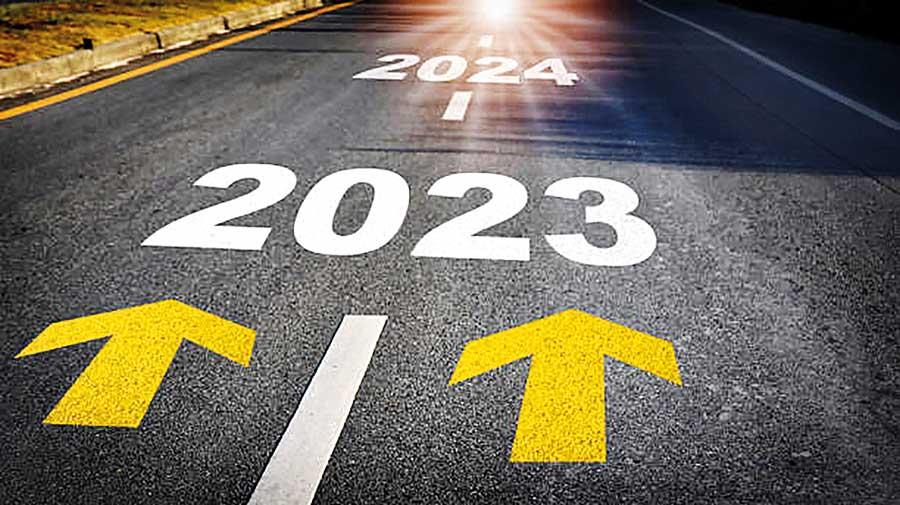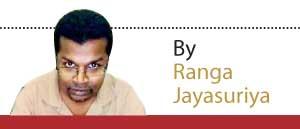Reply To:
Name - Reply Comment

Sri Lanka staggered through much of the last year but emerged better than expected. Considering the challenges of yesteryear, when the inflation was running at 70 per cent, and popular scare mongers were threatening the capture of the state, this year should be a cakewalk. Though by no means challenges ahead are inconsequential, they are manageable. However, Sri Lankans have a knack for taking things for granted. That should make one worry that this could be the make-or-break year; the year that could decide where the country will be in five to ten years.
of yesteryear, when the inflation was running at 70 per cent, and popular scare mongers were threatening the capture of the state, this year should be a cakewalk. Though by no means challenges ahead are inconsequential, they are manageable. However, Sri Lankans have a knack for taking things for granted. That should make one worry that this could be the make-or-break year; the year that could decide where the country will be in five to ten years.
Economy
A few factors stand out. Firstly, the economic recovery, recorded since the third quarter of 2023, may go on until the second half of this year. In part, because the economy that had shrunk during the corresponding quarters of the last year may record a catch-up growth. But then, when a long-term pro-business policy and much awaited economic reforms are needed to generate long-term economic growth, the election fever would engulf the country. For the second half of this year, economic populism and the pie-in-the-sky promises will overwhelm any economic common sense. Some have already threatened to walk back on the IMF program without divulging their ‘magic formula’ for the alternative course of action. Such self-seeking stupidity would gain credence and dampen investor interests. Economic recovery beyond the second half of this year is not guaranteed, and feuding politics and street protests, generally led by usual culprits, would make it extra hard.
Politics
Secondly, Sri Lanka does not have a viable alternative government at the moment. Popular disgruntlement has led to extreme polarization and choices far more destabilizing than the current status quo. The JVP/NPP rides on a wave of popular despair by simply regurgitating these grievances. They offer no solutions and do not seem to think that is necessary either. A JVP success at elections would lead the country into an uncertain future; at its mildest, it would be as devastating as Sirimavo Bandaranaike’s quasi-socialist government of 1970-77 that sucked out the last remnants of the competitive advantage of the post-colonial economy. But for a population preached by economic cavemen that Sirimavo did wonders and had her policies continued Sri Lanka would have produced miracles; such a suicidal level of economic populism does not register.
The other alternative political force, SJB, which could form a viable government in association with the UNP, is obsessed with its petty differences with Ranil Wickremesinghe. Such obsession may pave the way for its electoral annihilation as it had been before, when it ran against Gotabaya Rajapaksa and the Pohottuwa.
Thus Sri Lanka is staring at an uncertain future. Choices before us are not the most optimum, but some are far more destructive than others. Unless a credible and common sense political alliance evolves, Sri Lanka risks committing a blunder reminiscent of electing Gotabaya Rajapaksa to power four years back.
China
Thirdly, there are external factors: Much of the rich world economy avoided a recession last year. Now that the worst days are behind, the Federal Reserve will likely cut the interest rates this year. This would result in a return to economic growth in many Western economies, though the growth will be uneven. Sri Lankan exports that have declined might pick up. However, its dependency on garments and low-end migrant workers as prime sources of foreign remittance for over three decades is as degenerative as anything can get.
Elsewhere, China, which has been Sri Lanka’s largest development partner, has not recovered from the post-COVID economic slump; it, too, is entering an uncertain future, saddled by a property bubble, high youth unemployment and worsening bilateral rivalry with the USA.
Though the Chinese loan bonanza has run out, Sri Lanka has been counting on Chinese FDI for the Colombo Port City and Hambantota Port Economic Zone. The slowing Chinese economy could constrain such investments. The excesses on the Belt and Road Initiative are currently being trimmed. Sri Lanka will have to diversify its development partners urgently; however, business-friendly legislation and land, labour, and trade reforms requisite to generate investor appetite would be lost in the populist dogmas of election slogans.
Security
Fourth is a matter of national security. The world is entering the year 2024 with two high-intensity wars: Russians in Ukraine and Israel in Gaza. Both will go on for much of 2024 or beyond. The Israeli campaign in Gaza is fueling emotions in the Muslims and risks their radicalization. Sri Lankans should not have misgivings that their own would be insulated. The Easter Sunday attacks and a wave of Arabization and Islamization leading to them revealed that such ignorance would be paid with lives. Therefore, renewed intelligence cooperation with foreign counterparts and domestic surveillance is a precaution.
Probably, on this count, President Ranil Wickmeresinghe’s pledge to allow Maulavis from Egypt and textbooks from the Gulf for local Madrassas would not help. That is while countries, for instance, France, have stopped letting in foreign accredited Imams, in order to ward off the overarching influence of Islamism.
Sri Lanka ceased the acceptance of foreign imams and began the vetting of Islamic textbooks after the Easter Sunday attacks. Mr Wickremesinghe may be aiming at the Muslim votes, but the majority of local Muslims have far more pressing concerns shared by their peers of other faiths. Therefore, the President is trying to empower the wrong kind. That would be a dangerous gamble.
Finally, if Sri Lanka is to have a real shot at the future, it should invest in what it has abundantly and in a reasonable form: human capital. Instead, we are exporting the lot to the Middle East in the form of housemaids and low-skilled workers. A forward-looking government would have retrained them in economically rewarding skills and found better-paid destinations. Our higher education policy is cannibalizing the future of four in every five youths who qualify for university. An industrious government would have prioritized building a network of universities with private sector cooperation and also invite the reasonably positioned global universities to open colleges in Sri Lanka. Then, it would cut the investment red tape, make it easier for global companies to invest in Sri Lanka, and rescue the public from local wheeler dealers milking this captive market.
One would hope that even a fraction of these not-so-grand ambitions could be achieved this year.
Follow @RangaJayasuriya on X